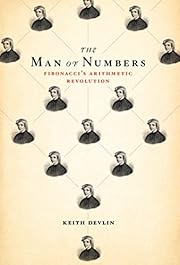

Cliquer sur une vignette pour aller sur Google Books.
|
Chargement... The Man of Numbers: Fibonacci's Arithmetic Revolution (original 2011; édition 2011)par Keith Devlin
Information sur l'oeuvreThe Man of Numbers: Fibonacci's Arithmetic Revolution par Keith Devlin (2011)
 Books Read in 2013 (665) Actuellement, il n'y a pas de discussions au sujet de ce livre.   ) )Keith Devlin con questo libro aveva deciso di prendersi una pausa dal suo lavoro di matematico, con la scusa che invecchiando ci si inaridisce, e ha scritto questa "biografia" di Fibonacci. Il guaio è che noi non abbiamo praticamente nessuna notizia biografica del nostro, e quindi tutto il testo è costellato di frasi del tipo "mah, dovrebbe essere successo questo ma non è che lo sappiamo" che alla lunga diventano stucchevoli. Quello che può al limite interessare sono le supposizioni su quale sia effettivamente stato il ruolo di Fibonacci nel fiorire dei libri dei maestri d'abaco: un po' poco, diciamocelo. Nulla da eccepire sulla traduzione di Daniele Didero. "The Man of Numbers: Fibonacci's Arithmetic Revolution" enthusiastically summarizes the little that is known about Leonardo of Pisa, later more famously called Fibonacci. Those who read medieval primary texts have become used to the dearth of direct evidence related to such texts, as well as the admirable, if Herculean, labors medievalists are forced to perform to prove the most basic biographical details. In the case of Leonardo of Pisa, the proof for his role in the "arithmetic revolution" has been fairly well-established, and is nicely summarized here. Well-known for his Fibonacci sequence, his greater contribution may have been the role he played in the transmission of arithmetic and algebra from Moslem North Africa to medieval Italy. Interestingly, this transmission appears to have proceeded along two tracks: First, in a formal, Latin primer on algebra--the famous Liber Abaci (1202)--via the educated elite, and second, through transmission to the Tuscan mercantile community in a format more suitable for the problems that would interest them via a lost primer--Di minor guisa--on commercial arithmetic for the "abbacus schools." Thus, Leonardo of Pisa seems to have played a significant role in both the rebirth of classical arithmetic and science, and the economic revolution that was already beginning to pull much of Italy into its cultural renaissance. aucune critique | ajouter une critique
In 2000, Keith Devlin set out to research the life and legacy of the medieval mathematician Leonardo of Pisa, popularly known as Fibonacci, whose book Liber abbaci has quite literally affected the lives of everyone alive today. Although he is most famous for the Fibonacci numbers--which, it so happens, he didn't invent--Fibonacci's greatest contribution was as an expositor of mathematical ideas at a level ordinary people could understand. In 1202, Liber abbaci--the "Book of Calculation"--introduced modern arithmetic to the Western world. Yet Fibonacci was long forgotten after his death, and it was not until the 1960s that his true achievements were finally recognized. Finding Fibonacci is Devlin's compelling firsthand account of his ten-year quest to tell Fibonacci's story. Devlin, a math expositor himself, kept a diary of the undertaking, which he draws on here to describe the project's highs and lows, its false starts and disappointments, the tragedies and unexpected turns, some hilarious episodes, and the occasional lucky breaks. You will also meet the unique individuals Devlin encountered along the way, people who, each for their own reasons, became fascinated by Fibonacci, from the Yale professor who traced modern finance back to Fibonacci to the Italian historian who made the crucial archival discovery that brought together all the threads of Fibonacci's astonishing story. Fibonacci helped to revive the West as the cradle of science, technology, and commerce, yet he vanished from the pages of history. This is Devlin's search to find him. -- Back cover. Aucune description trouvée dans une bibliothèque |
Critiques des anciens de LibraryThing en avant-premièreLe livre Man of Numbers de Keith Devlin était disponible sur LibraryThing Early Reviewers. Discussion en coursAucunCouvertures populaires
 Google Books — Chargement... Google Books — Chargement...GenresClassification décimale de Melvil (CDD)512.7Natural sciences and mathematics Mathematics Algebra Number theoryClassification de la Bibliothèque du CongrèsÉvaluationMoyenne: (3.45) (3.45)
Est-ce vous ?Devenez un(e) auteur LibraryThing. |
||||||||||||||||||||||||||||||||||||||||||||||||||||||||||||||||||||||||||||||||||||||||||||||||||||||||||||||||||||||||||||||||||||||